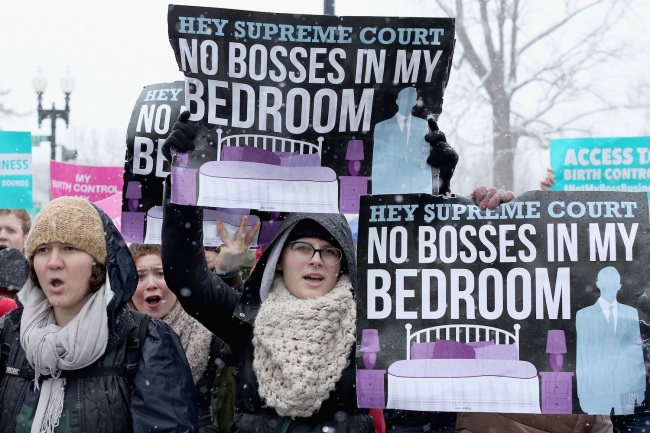Today, the Supreme Court made its ruling in Burwell v Hobby Lobby, a case also known as the Hobby Lobby Case. Five men ruled that Hobby Lobby and other for-profit corporations had the right to deny birth control coverage to women if the corporate heads are religious. Let’s dissect this and discuss.
“Five Men”: The five male SCOTUS judges who voted in favor of Hobby Lobby were Clarence Thomas, Antonin Scalia, John Roberts, Anthony Kennedy and Samuel Alito, Jr. Notice that once again men have just made a decision about women’s health care.
Hobby Lobby: David Green is the owner of this Christian craft store chain. He and his wife felt that the ACA requirement that birth control be provided to employees with healthcare benefits was a “substantial burden” to them as their brand of Christian beliefs don’t allow for birth control access. They do allow for vasectomies apparently though since HL’s health insurance plan will still cover those.
A Corporation Head’s Religious Beliefs: The ruling today allows religious corporations to deny birth control coverage to employees based on the corporate head’s religion. I have two analogies for you to help understand the complete and utter BS this is.
- I am on a diet, so I no longer eat donuts. You eat a donut every morning for breakfast and we work in the same building. I feel that because I am on a no-donut diet, you should not be allowed to eat donuts anymore. It’s a burden for me to have to deal with the knowledge that someone is living their life differently from mine. I go to our boss and demand donuts be banned from the entire business. He agrees and now you can no longer eat donuts because of my personal no-donut lifestyle.
- A teacher is fasting for religious reasons. Despite laws saying students must get a 30 minute lunch period, the teacher feels that it violates her religion to allow others to eat while her God says it’s fasting time. So the teacher withholds lunch from her students because of her personal practices.
Hobby Lobby’s owner is religious and he feels this grants him the authority to override the ACA and force his employees to comply with his interpretation of the Bible.
Many researchers and scientists have proved that 60% of women take birth control for non-contraceptive purposes. But I honestly don’t care about that statistic. I don’t think it matters why a woman decides to take birth control. Women are not obligated to share their personal medical business with their employers. Should I begin inviting my employer and representatives to come to the doctor with me? Well, my employer doesn’t give me any benefits, so maybe just my representatives. They seem really interested in controlling my healthcare so they should just get to work with it first-hand.
Some men are whining that health insurance plans don’t cover condoms, so women should just suck it up and pay for our birth control. The difference here between men’s condoms and women’s birth control is that men don’t have to go to a doctor and get a pelvic exam to get condoms. There are sites that send out free condoms and clinics and they’re fairly cheap considering how great they are at preventing parenthood. But birth control requires doctors and exams and prescriptions or insertions and they do a range of things regarding women’s reproductive health. And they can be hella expensive.
The bigger problem here is that SCOTUS has declared that a corporation can bypass providing health care that contradicts the owner’s beliefs. Can Jehovah’s Witnesses who own businesses refuse to cover blood transfusions? Can highly religious owners refuse to cover vaccinations? Religious beliefs do not have to be respected by all and the beliefs of one should not influence the lives of anyone else. The wording of the ruling specifies that this only applies to contraception, but could those religious business owners not point to this case as grounds for their own?
Corporations have been given more rights than 51% of the US population- women. Corporations now control what women can and cannot have in regards to healthcare. Corporations now get to decide what women’s healthcare can be. We must remember the recent history in which women weren’t trusted to make their own decisions about anything and it seems that we’re falling back into that trend.


